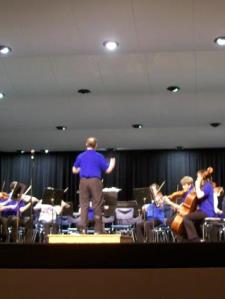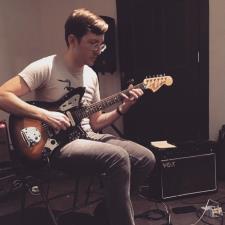345 Answered Questions for the topic Theory
04/03/19
tips for writing the drum notes to a song in a band?
I play the drums in a band, and the song has already been written and everything that the vocalist, guitarist and bassist will play. The drums were left out and I have to write them to fit the...
more
04/03/19
What's the point of chords such as sus and 7th chords?
Every time I play major7th or minor7th it doesn't make me feel any different than the normal major or minor chord, so what's the point of such chords? What do these chord qualities accomplish that...
more
04/02/19
Do classical pieces sound different today than the originals due to temperament?
I was reading how classical music used to not be in equal temperament. So each of their keys sounded completely different and that's why they named their pieces after the keys they were playing....
more
03/30/19
Geometric Voice Leading Presentation?
I'm coming from a non-academic background and just trying to understand the rules of voice leading for pursuing a future composing career.
I've always found difficulties in understanding this topic...
more
03/29/19
What is a "Slovenian Cadence"?
I recently acquired a large collection of music theory review materials. In it, I came across the term "Slovenian cadence." Does anyone know what this might be? Unfortunately, the review materials...
more
03/28/19
What other modes/scales can i play over a song in the Key of Eb Minor?
I'm wanting to have two pieces of music flow from one to another, first one will be completely original and performed by me the other one is a song that already exists. I've already discovered that...
more
03/27/19
Is there a set of closely related keys in modern popular music?
In my knowledge, the closely related keys in classical music are:
In C-major:
1. C-major (Tonic, original) `♮`
2. d-minor (Supertonic, relative of subdominant) `♭`
3. e-minor (Mediant, relative...
more
03/27/19
When playing in a minor key, will the chords be minor as well?
I've been jumping into music theory myself and I've been stumbling on creating certain melodies and such. I've played guitar all my teenage life and not once have I ever sat down and said I'm going...
more
03/27/19
How do I correctly borrow chords from one key to another?
So how does one decide to borrow chords? Let's say I am in the key of C Major. Can I borrow chords, say, from the G Major key? How does this work?
03/27/19
Are chord resolutions objective?
Im looking into chord resolution at the moment and i wonder from then way people in online tutorials talk about them if a certain chord always resolves to the same chord. Or does it depend on its...
more
Theory Music Theory
03/27/19
how do all the notes of the same name relate?
I suppose that frequencies were randomly assigned letter names
here we have A4 = 440Hz
http://www.phy.mtu.edu/~suits/notefreqs.html
C3 here = 130.81Hz
C4 here = 261.63Hz
C5 here =...
more
03/27/19
Is it possible to write a song without a key?
Is it possible to say "This song has no key"? Are there songs that have/follow no key? Is it possible to create song without adhering a key?
03/27/19
Can someone explain the theory behind the changes in Superstition by Stevie Wonder?
I'm learning Stevie Wonder's Superstition on guitar (an awesome song) and I'm really curious about the theory behind the changes in the chorus. The intro and verse are just a riff in E minor...
more
03/27/19
What purpose do accidentals serve in music?
I'm having trouble writing music containing accidentals.If the diatonic scale contains 7 related notes, what purpose do accidentals serve? If the accidental notes are not related to the overall...
more
03/26/19
Did Jeff Beck "play the changes" on Goodbye Porkpie Hat?
I have read several different accounts of Charles Mingus' reaction to Jeff Beck's cover of Goodbye Porkpie Hat. One account says he liked it and sent Jeff a note saying this while another says he...
more
03/26/19
Alternative theories of harmony?
Do you know of any alternative (to functional) descriptive theories of harmony or attempts at creating them?
By that I mean attempts to explain both functional and non-functional harmonies in a...
more
03/26/19
What's the difference between arpeggio and broken chord?
I always thought of them as synonyms, but googling around found that some people see them as different, with the distinctions changing depending on who you ask.
Is there a formal distinction...
more
03/26/19
Is it possible to write a song without a key?
This song is in F Major, "That song is in A Minor", "This song is in D Minor, but modulates to F Major in the middle", etc.Can we say "This song has no key"? Are there songs that have/follow no...
more
03/26/19
How do classical composers write music?
I am starting to learn about music theory and today it hit me how do classical composers such as Mozart and Beethoven are able to write music for instruments they don't play, such as (for example...
more
03/26/19
Ornaments in ABRSM theory, start on the note or the note above?
I know that depending on the era you can either start on the note or note above in some ornamentation such as a turn or mordent. For Abrsm grade 8 theory do you start on the note or the note above...
more
03/26/19
Collective word for sharps and flats in the key signature?
On a mailing list I'm subscribed to, someone recently asked what the collective name was in English for the sharps and flats you find in the key signature. Apparently, the closest translation from...
more
03/26/19
How to create Chord progressions that make sense?
I've been reading over Walter Piston's Harmony book, and it has been an eye-opener to say the least. I understand concepts like tension and release, voice leading and so forth, but I still don't...
more
03/26/19
Chromatic vs Non-diatonic vs Accidental?
I was wondering if all three of these terms: chromatic, non-diatonic, accidental, all mean the same thing?
03/19/19
What does it mean to be able to write a fugue?
My theory teacher told me once in passing that she had written fugues. Later on people let me know that to write a fugue you need to be somewhat of a theory genius. Why is this so? What makes the...
more
03/19/19
How to differentiate between relative keys?
So I'm learning that C major and A minor scales have the same notes.
Then, if I look at, say, 10 consecutive single notes, how do I tell if they're in C or Am?
It's easier when you see a chord,...
more
Still looking for help? Get the right answer, fast.
Ask a question for free
Get a free answer to a quick problem.
Most questions answered within 4 hours.
OR
Find an Online Tutor Now
Choose an expert and meet online. No packages or subscriptions, pay only for the time you need.






























